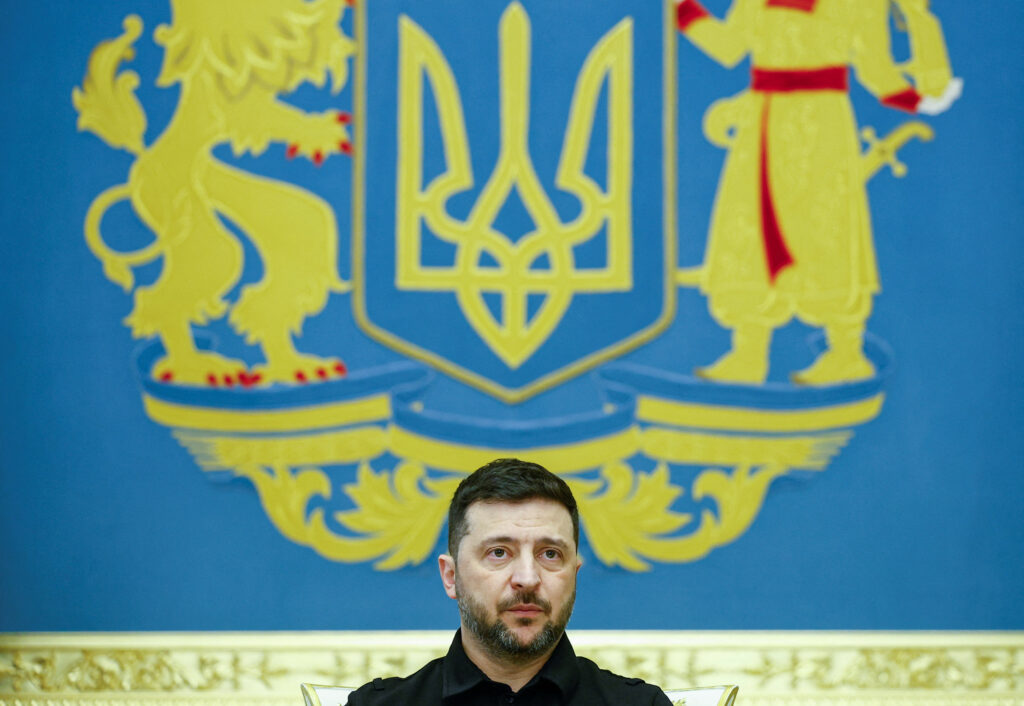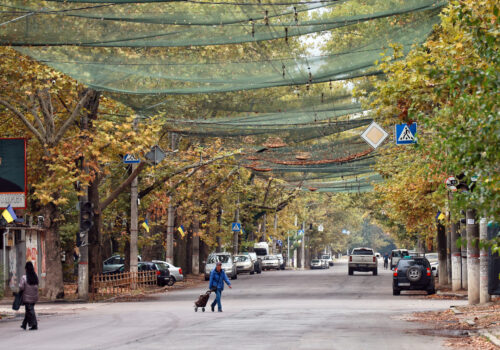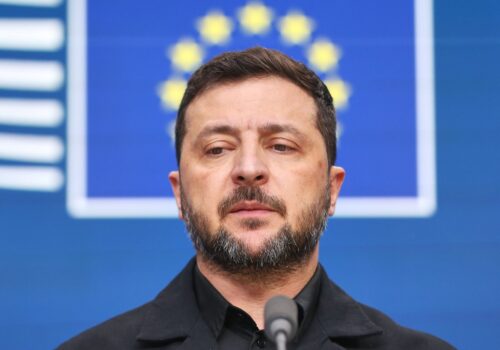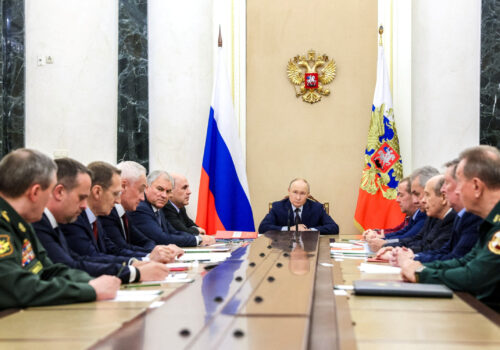Editor’s note: This article was updated on November 17 to include Herman Halushchenko’s response to the corruption investigation.
Amid Russia’s ongoing invasion, Ukraine is now facing the largest corruption scandal of Volodymyr Zelenskyy’s presidency. It is a scandal with the potential to reshape the country’s politics. The intrigue, which involves alleged kickbacks in the graft-prone energy sector laundered through Russian-linked channels by close associates of President Zelenskyy, may prove as big a test of his leadership as the war itself.
On November 10, the National Anti-Corruption Bureau of Ukraine (NABU) exposed an alleged $110 million corruption scheme at state-owned nuclear company Energoatom. The charges are supported by a fifteen-month wiretap and over seventy searches carried out as part of a major investigation called Operation Midas.
According to NABU officials, the investigation uncovered a criminal enterprise run by Timur Mindich, a film producer and a former business partner of Zelenskyy. Additional suspects include former Minister of Energy and recently appointed Minister of Justice Herman Halushchenko; former Naftogaz CEO and Deputy Prime Minister Oleksii Chernyshov; former Minister of Defense and current National Security and Defense Council member Rustem Umerov; and Ihor Myroniuk, former deputy head of the State Property Fund and former advisor to Halushchenko.
Mindich fled Ukraine the day before his premises were raided and is reportedly now in Israel. Both Chernyshov and Mindich have long had ties with Zelenskyy, who co-founded the latter’s production company in 2003. Thus far, formal charges have been filed against eight of those implicated. Halushchenko has said he would defend himself against the accusations.
The alleged theft took the form of 10-15 percent inflated prices for infrastructure project contracts, which contractors were forced to pay in order to avoid losing their supplier status. The kickback scheme reportedly included security measures for the Khmelnytskyi Nuclear Power Plant. The Ministry of Energy is suspected of facilitating the scam.
The stolen funds were allegedly laundered through an office linked to fugitive ex-Ukrainian MP and now Russian Senator Andrii Derkach before being extracted from Ukraine. Derkach has been sanctioned since 2021 and was stripped of his Ukrainian citizenship in 2023.
Stay updated
As the world watches the Russian invasion of Ukraine unfold, UkraineAlert delivers the best Atlantic Council expert insight and analysis on Ukraine twice a week directly to your inbox.
While the investigation is still underway, the scandal is already proving extremely damaging to Zelenskyy and his entire administration. The alleged involvement of a former Ukrainian MP turned Russian fugitive in the middle of the Kremlin’s ongoing invasion of Ukraine may be the most scandalous aspect of the accusations.
Meanwhile, Zelenskyy’s long contact with many of the accused and their high-level appointments has raised the political stakes for the President. This has led to speculation over whether the scandal could topple Zelenskyy and cost Ukraine the war.
The investigation comes in the wake of a recent standoff between Zelenskyy and his administration with Ukraine’s anti-corruption institutions. In July 2025, a law proposed by Zelenskyy’s political party was passed by the Ukrainian parliament stripping NABU and other anti-corruption institutions of their independence.
This led to vocal condemnation from Ukraine’s civil society and the international community, including the largest street protests since the start of Russia’s full-scale invasion. Days later, Zelenskyy reconsidered and signed a law that restored and guaranteed the independence of the country’s anti-corruption agencies.
That guarantee has now been tested and proven credible. While the sheer number of criminal investigations and indictments targeting prominent Ukrainian officials has raised concerns about possible political prosecutions by NABU, the apparent success of Operation Midas and its exposure of alleged corruption on the part of some of the most powerful people in Ukraine would seem to confirm the agency’s independence and its efficacy.
Eurasia Center events

Zelenskyy appears to recognize the dangers of the situation and has begun responding to the crisis. The Cabinet of Ministers is looking at sanctions against Mindich and businessman Oleksandr Tsukerman, who was also implicated in the scandal. The Ukrainian leader has already forced the resignations of Halushchenko and newly appointed Minister of Energy Svitlana Hrynchuk.
Meanwhile, Ukrainian Prime Minister Yulia Svyrydenko has announced a comprehensive audit of all state-owned companies, especially in the energy and defense sectors. Anastasia Radina, head of the parliament’s anti-corruption committee, has called for a parliamentary inquiry into the transfer of funds to Russia.
These steps are significant but are unlikely to prove adequate. The stakes are extremely high, not just for Zelenskyy’s political future, but for Ukraine’s conduct of the war. European leaders answer to their citizens, many of whom might now be wondering why they are sending massive aid to Ukraine if large sums are being siphoned off by privileged insiders. In the US, while Trump is slowly moving in the right direction with recent sanctions on Russia, there are still influential figures in his orbit who are looking for ways to end all American support for Ukraine’s defense against Kremlin aggression.
This means that Zelenskyy must turn his attention to the crisis energetically. A good next step would be for him to speak up on the issue publicly and strongly, much as he did in the first days of Russia’s full-scale invasion.
Zelenskyy might start by acknowledging, as former US President Harry Truman did when he said the buck stops with him, that as President of Ukraine, he is ultimately responsible for failures in his government. He should recognize the magnitude of the scandal and the underlying problem of corruption, while explaining how he intends to take the lead in fixing it. This means bringing to justice, in accordance with the law, all those responsible, no matter who they are and where they are. He can do this by vowing to empower NABU and other relevant state institutions fully.
Zelenskyy could frame the scandal as proof that despite clear progress made by Ukraine in dealing with corruption, much more remains to be done. He could demonstrate his openness by inviting advice from Ukrainian civil society and the country’s international partners. This current crisis has clearly demonstrated the dangers of relying on just a small circle at Bankova to get things done.
Such a speech should not be a one off. It should be the start of a dialogue with the Ukrainian public, much like Zelenskyy’s masterful wartime communications. This dialogue should include regular updates on efforts to bring those responsible for this theft to justice, and news about steps to strengthen state institutions against the scourge of corruption. Zelenskyy has the skills to take this on. Now is the time to do it.
Suriya Evans-Pritchard Jayanti is a nonresident senior fellow at the Atlantic Council’s Eurasia Center.
Further reading
The views expressed in UkraineAlert are solely those of the authors and do not necessarily reflect the views of the Atlantic Council, its staff, or its supporters.

The Eurasia Center’s mission is to enhance transatlantic cooperation in promoting stability, democratic values, and prosperity in Eurasia, from Eastern Europe and Turkey in the West to the Caucasus, Russia, and Central Asia in the East.
Follow us on social media
and support our work
Image: Ukraine's President Volodymyr Zelenskyy speaks as he answers a question during a meeting with the media, amid Russia's attack on Ukraine, in Kyiv, Ukraine. November 7, 2025. (REUTERS/Valentyn Ogirenko)




